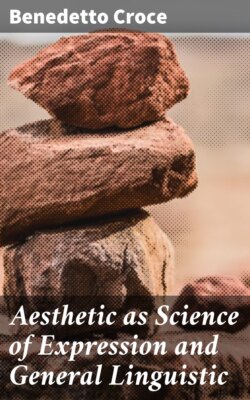Aesthetic as Science of Expression and General Linguistic

Реклама. ООО «ЛитРес», ИНН: 7719571260.
Оглавление
Benedetto Croce. Aesthetic as Science of Expression and General Linguistic
Aesthetic as Science of Expression and General Linguistic
Table of Contents
INTRODUCTION. THEORY. I INTUITION AND EXPRESSION
II INTUITION AND ART
III ART AND PHILOSOPHY
IV HISTORICISM AND INTELLECTUALISM IN AESTHETIC
V ANALOGOUS ERRORS IN HISTORY AND IN LOGIC
VI THEORETIC AND PRACTICAL ACTIVITY
VII ANALOGY BETWEEN THE THEORETIC AND THE PRACTICAL
VIII EXCLUSION OF OTHER SPIRITUAL FORMS
IX INDIVISIBILITY OF EXPRESSION INTO MODES OR GRADES AND CRITIQUE OF RHETORIC
X AESTHETIC SENTIMENTS AND THE DISTINCTION BETWEEN THE BEAUTIFUL AND THE UGLY
XI CRITIQUE OF AESTHETIC HEDONISM
XII THE AESTHETIC OF THE SYMPATHETIC AND PSEUDO-AESTHETIC CONCEPTS
XIII THE SO-CALLED PHYSICALLY BEAUTIFUL IN NATURE AND IN ART
XIV ERRORS ARISING FROM THE CONFUSION BETWEEN PHYSIC AND AESTHETIC
XV THE ACTIVITY OF EXTERNALIZATION. TECHNIQUE AND THE THEORY OF THE ARTS
XVI TASTE AND THE REPRODUCTION OF ART
XVII THE HISTORY OF LITERATURE AND OF ART
XVIII CONCLUSION: IDENTITY OF LINGUISTIC AND AESTHETIC
HISTORICAL SUMMARY
APPENDIX
INTRODUCTION
DOUGLAS AINSLIE
I
INTUITION AND EXPRESSION
II
INTUITION AND ART
III
ART AND PHILOSOPHY
IV
HISTORICISM AND INTELLECTUALISM IN AESTHETIC
V
ANALOGOUS ERRORS IN HISTORIC AND LOGIC
VI
THEORETIC AND PRACTICAL ACTIVITY
VII
ANALOGY BETWEEN THE THEORETIC AND THE PRACTICAL
VIII
EXCLUSION OF OTHER SPIRITUAL FORMS
IX
INDIVISIBILITY OF EXPRESSION INTO MODES OR GRADES AND CRITIQUE OF RHETORIC
X
AESTHETIC FEELINGS AND THE DISTINCTION BETWEEN THE UGLY AND THE BEAUTIFUL
XI
CRITIQUE OF AESTHETIC HEDONISM
XII
THE AESTHETIC OF THE SYMPATHETIC AND PSEUDO-AESTHETIC CONCEPTS
XIII
THE SO-CALLED PHYSICALLY BEAUTIFUL IN NATURE AND ART
XIV
MISTAKES ARISING FROM THE CONFUSION BETWEEN PHYSIC AND AESTHETIC
XV
THE ACTIVITY OF EXTERNALIZATION, TECHNIQUE AND THE THEORY OF THE ARTS
XVI
TASTE AND THE REPRODUCTION OF ART
XVII
THE HISTORY OF LITERATURE AND ART
XVIII
CONCLUSION: IDENTITY OF LINGUISTIC AND AESTHETIC
HISTORICAL SUMMARY
I. AESTHETIC IDEAS IN GRAECO-ROMAN ANTIQUITY
II
AESTHETIC IDEAS IN THE MIDDLE AGE AND IN THE RENAISSANCE
III
SEVENTEENTH AND EIGHTEENTH CENTURIES
APPENDIX
PURE INTUITION AND THE LYRICAL CHARACTER OF ART
II
III
Отрывок из книги
Benedetto Croce
Published by Good Press, 2019
.....
The philosopher feels that he has a great mission, which is nothing less than the leading back of thought to belief in the spirit, deserted by so many for crude empiricism and positivism. His view of philosophy is that it sums up all the higher human activities, including religion, and that in proper hands it is able to solve any problem. But there is no finality about problems: the solution of one leads to the posing of another, and so on. Man is the maker of life, and his spirit ever proceeds from a lower to a higher perfection. Connected with this view of life is Croce's dislike of "Modernism." When once a problem has been correctly solved, it is absurd to return to the same problem. Roman Catholicism cannot march with the times. It can only exist by being conservative—its only Logic is to be illogical. Therefore, Croce is opposed to Loisy and Neo-Catholicism, and supports the Encyclical against Modernism. The Catholic religion, with its great stores of myth and morality, which for many centuries was the best thing in the world, is still there for those who are unable to assimilate other food. Another instance of his dislike for Modernism is his criticism of Pascoli, whose attempts to reveal enigmas in the writings of Dante he looks upon as useless. We do not, he says, read Dante in the twentieth century for his hidden meanings, but for his revealed poetry.
I believe that Croce will one day be recognized as one of the very few great teachers of humanity. At present he is not appreciated at nearly his full value. One rises from a study of his philosophy with a sense of having been all the time as it were in personal touch with the truth, which is very far from the case after the perusal of certain other philosophies.
.....